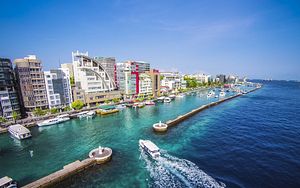Earlier this month, Maldives announced its intention to leave the Commonwealth, leaving the 53-state global organization. Maldives became the second country to voluntarily leave the Commonwealth after Zimbabwe, which left in 2003.
Maldives’ decision to leave the organization came after weeks of pressure by the Commonwealth Ministerial Action Group (CMAG) for the island country to take action on backsliding democratic norms, eroding human rights standards, and for Male to promote the rule of law.
In announcing its decision to leave the Commonwealth, Maldives Foreign Ministry accused the organization, which is comprised mostly of former British colonies, of “treating it unjustly and unfairly.” The government further alleged that the organization was attempting to use Maldives “in the name of democracy promotion, to increase the organization’s own relevance and leverage in international politics.”
The Commonwealth expressed “deep disappointment at the lack of progress” on a range of issues it had encourage Maldives to work on in September. CMAG, empowered by the Commonwealth to deal with “persistent and serious violators of the Commonwealth’s shared principles,” had given Maldives until March 2017 to act.
In an op-ed in the Independent, Maldives’ foreign minister called the Commonwealth’s condemnation of Maldives “kneejerk grandstanding.”
As I’ve noted before in The Diplomat, the outlook for democratic norms in Maldives has consistently receded since 2015 when President Abdulla Yameen’s government to a range of moves against the political opposition in the country, followed by a wider crackdown and consolidation of executive power.
In 2015, Mohamed Nasheed, the island’s first democratically elected leader after three-decades of autocratic rule, was imprisoned on terror charges. Nasheed’s trial was widely criticized for its politicized nature, with the UN Working Group of Arbitrary Detention condemning his imprisonment.
In addition to Nasheed, other leaders in Maldives have faced imprisonment and prosecution as well.
The decision to leave the Commonwealth could lead to additional political instability in Maldives. Last week, when the decision was put to a vote, fewer than half of all Maldivian lawmakers voted in favor of leaving.
The vote took place amid an internal split within Yameen’s ruling Progressive Party of Maldives, with one half being led by the president and the other led by Maumoon Abdul Gayoom, the three-decade-long autocratic ruler of the country and Yameen’s half-brother.
Nigeria, Pakistan, and Fiji have all faced suspension from the Commonwealth in the past, with the latter two having been suspended twice. Zimbabwe withdrew voluntarily after being suspended in 2002 and The Gambia withdrew in 2013.
































